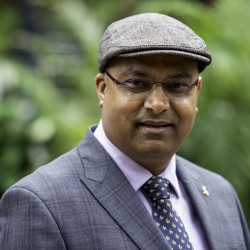The kitchen is key to improving indoor air quality
Reducing air pollution in kitchens could drastically improve health outcomes for the most vulnerable communities globally, say experts from the University of Surrey.
Indoor air pollution generated by cooking fuels such as charcoal and wood causes approximately four million premature deaths every year – a tragic statistic that Surrey's renowned Global Centre for Clean Air Research (GCARE) is aiming to address with its Kitchen Pollution Guidance.
This comprehensive guidance is led by Professor Prashant Kumar and a team of over 50 co-authors from 20 countries. This guidance presents scientific research on practical measures that are easy to implement. It offers helpful tips and actionable advice for individuals while also suggesting actions that housing providers and governing bodies can take.
To spread the word even further, the GCARE team has produced a short video summarising its kitchen guidance.
Professor Prashant Kumar, Founding Director of GCARE, said:
"We all take clean air for granted, particularly when we are in the kitchen – a room that is central in many people's homes across the world. Our guidance is now available in 17 different languages, a fact that demonstrates that we are passionate about passing on this knowledge to as many people as possible."
The guidance provides several targeted recommendations for ordinary citizens, housebuilders, and policymakers. Key recommendations for ordinary citizens include:
Reduce the number of meals you fry in the kitchen.
Steer towards shorter cooking sessions.
Keep children (and other people who are not preparing a meal) out of the kitchen.
Open kitchen windows during cooking to reduce carbon dioxide.
GCARE's kitchen guidance has recently been adopted and promoted by the Egyptian government.
Dr Yasmin Fouad from Egypt's Ministry of the Environment said:
"We are working to support all procedures and good practices to avoid the negative effects of emissions that cause environmental air pollution both indoor and ambient."
###
Notes to editors
Professor Prashant Kumar is available for interview upon request.
For more information, please contact the University of Surrey press office via mediarelations@surrey.ac.uk
Find out more about GCARE and its research projects.
Media Contacts
External Communications and PR team
Phone: +44 (0)1483 684380 / 688914 / 684378
Email: mediarelations@surrey.ac.uk
Out of hours: +44 (0)7773 479911

